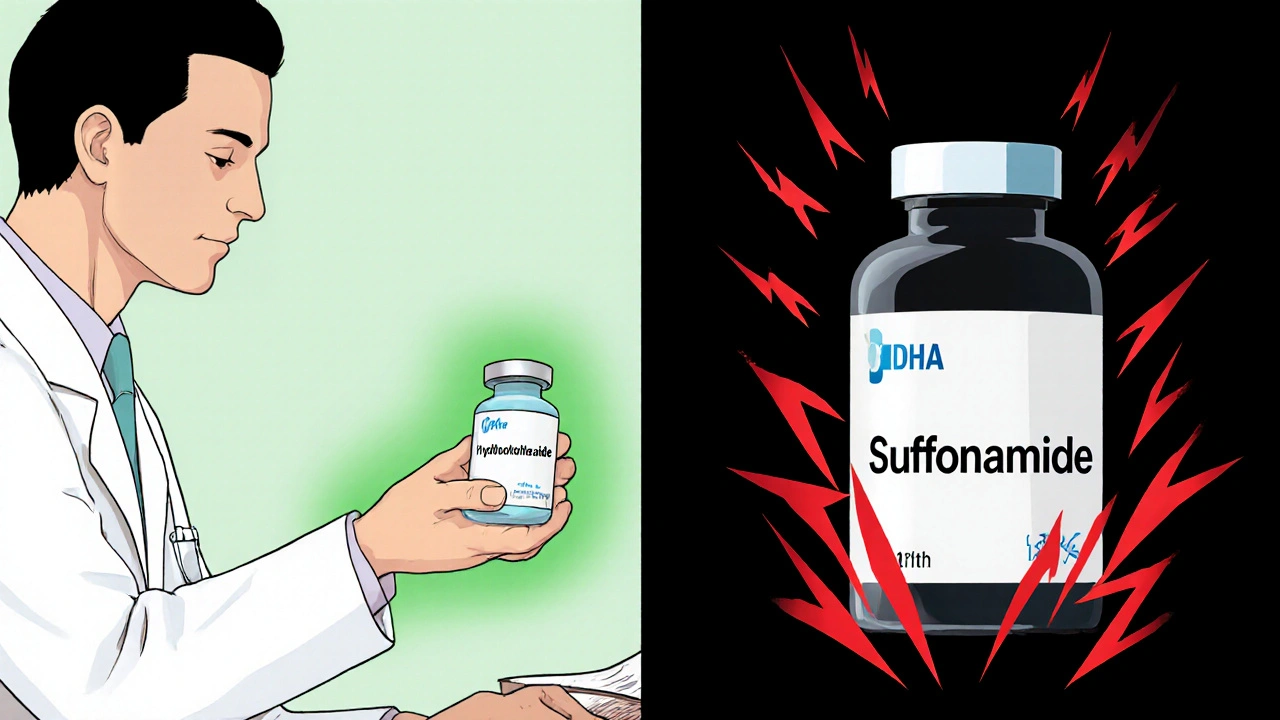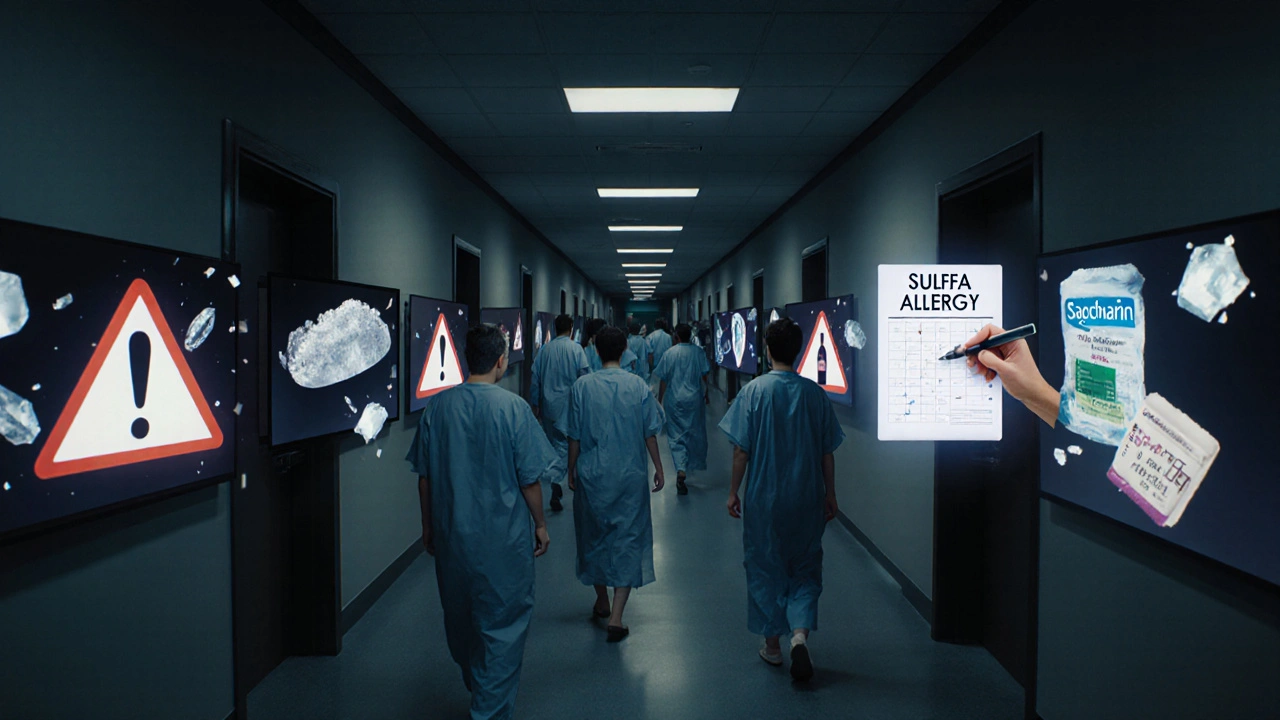
Many people believe they’re allergic to "sulfa" drugs - and for good reason. A rash after taking Bactrim or Septra can be scary. But here’s the truth most don’t know: if you’re told you have a "sulfa allergy," you might be avoiding safe, necessary medications for no reason. The problem isn’t the sulfur atom. It’s a specific chemical structure found only in certain antibiotics. And confusing the two can cost you more than just a pill - it can cost you better treatment, longer hospital stays, and even riskier antibiotics.
What Actually Causes a Sulfa Allergy?
When someone says they have a "sulfa allergy," they usually mean they reacted to an sulfonamide antibiotic - like sulfamethoxazole (in Bactrim or Septra), sulfadiazine, or sulfacetamide. These drugs were among the first antibiotics ever developed, back in the 1930s. But not all drugs with "sulfa" in the name are the same. The real culprit isn’t sulfur. It’s a specific part of the molecule called the arylamine group at the N4 position. When your body breaks down these antibiotics, it creates a reactive compound called hydroxylamine. That’s what triggers an immune response in some people - leading to rashes, fever, or in rare cases, life-threatening conditions like Stevens-Johnson Syndrome. But here’s the key: non-antibiotic sulfonamides don’t have this same structure. That means drugs like hydrochlorothiazide (for high blood pressure), furosemide (a water pill), celecoxib (Celebrex, for arthritis), and acetazolamide (for glaucoma) are chemically different. They don’t produce hydroxylamine the same way. So even though they contain sulfur, they don’t trigger the same immune reaction.What Medications Are Actually Safe?
If you’ve been told you have a sulfa allergy, you’ve likely been warned off a long list of medications. But most of those warnings are outdated - and potentially harmful. Medications to avoid if you have a true sulfonamide antibiotic allergy:- Sulfamethoxazole-trimethoprim (Bactrim, Septra)
- Sulfadiazine
- Sulfacetamide (eye drops)
- Dapsone (used for leprosy and skin conditions)
- Hydrochlorothiazide (HCTZ)
- Furosemide (Lasix)
- Chlorthalidone
- Celecoxib (Celebrex)
- Acetazolamide
- Sulfonylureas (like glyburide for diabetes)
How Common Are Real Allergies?
About 3% of people in the U.S. say they have a sulfa allergy. But when doctors test them, only 1.5-2% actually have a true IgE-mediated reaction. The rest? They had a rash from a virus, a side effect like nausea, or a reaction that was mislabeled years ago. A landmark 2003 study of over 17,500 patients with documented sulfa allergies found that 9.5% of people without any sulfa allergy had a reaction to non-antibiotic sulfonamides. The group with the allergy? Only 9.9%. That’s not a risk - that’s normal background noise. In contrast, the same study found that people with a confirmed sulfonamide antibiotic allergy had a 2.5 times higher chance of reacting to another antibiotic in the same class. That’s the real cross-reactivity - and it’s limited to that group.
Why This Misunderstanding Matters
Let’s say you need a diuretic for heart failure. Your doctor wants to prescribe furosemide. But your chart says "allergic to sulfa." So they pick something else - maybe spironolactone. It works, but it can raise potassium levels dangerously. Or worse - they avoid diuretics entirely, and you end up back in the hospital with fluid overload. Or you have arthritis and need pain relief. Celecoxib is a great option. But your provider skips it because of your "sulfa allergy." So you get ibuprofen instead - which can cause stomach bleeding or kidney issues, especially in older adults. A 2022 report from the Patient Safety Network found that 12.3% of antibiotic errors in hospitals are tied to incorrect sulfa allergy labels. That means people are getting broader-spectrum antibiotics like fluoroquinolones - drugs that carry a much higher risk of C. difficile infection. The odds? 2.15 times higher. The economic cost? Over $1.2 billion a year in the U.S. alone - from unnecessary tests, longer stays, and pricier alternatives.What Should You Do If You Think You Have a Sulfa Allergy?
Step one: Don’t panic. But do get clarity. If you had a mild reaction - like a skin rash without fever, swelling, or breathing trouble - you may be able to safely take non-antibiotic sulfonamides. A simple test called a single-therapeutic-dose challenge can confirm it. In one study, 98.7% of patients who’d been labeled "sulfa allergic" tolerated hydrochlorothiazide after a supervised challenge. If you had a severe reaction - Stevens-Johnson Syndrome, toxic epidermal necrolysis, or DRESS syndrome - you should avoid all sulfonamide antibiotics for life. But even then, non-antibiotic sulfonamides are still safe. Ask your doctor or pharmacist:- "Was my reaction to a specific antibiotic, or just any drug with sulfa in the name?"
- "Can you check if my allergy is documented as "sulfonamide antibiotic allergy" in my records?"
- "Can we do a challenge test for HCTZ or furosemide if I need it?"

What About Other "Sulfa" Things? Sulfites, Sulfates, Saccharin?
Nope. None of those are related. You can safely drink wine (contains sulfites), take Epsom salt baths (magnesium sulfate), or use artificial sweeteners like Sweet’N Low (saccharin). These have nothing to do with sulfonamide antibiotics. They don’t contain the arylamine group. Your immune system doesn’t confuse them. This is a common myth - and it leads people to avoid everything from wine to salt substitutes unnecessarily.What’s Changing in Healthcare?
The medical community is catching up. The American Academy of Allergy, Asthma & Immunology (AAAAI) and the Cleveland Clinic both issued clear guidelines in 2022-2023 stating: There is no significant cross-reactivity between antibiotic and non-antibiotic sulfonamides. Electronic health records are starting to change too. Epic Systems and Cerner now let providers tag allergies as "sulfonamide antibiotic allergy" - not just "sulfa allergy." That’s huge. One pilot showed a 42% drop in incorrect alerts. Pharmacists are also stepping in. A 2021 study found that when pharmacists reviewed allergy lists and clarified them, unnecessary restrictions dropped by nearly 70%. That’s not just better care - it’s $287 saved per patient.Bottom Line: Get Specific, Don’t Guess
A "sulfa allergy" label is often a red herring. It sounds serious - and it should be taken seriously. But it shouldn’t be used as a blanket warning for every drug with sulfur in it. If you’ve been told you’re allergic to sulfa, ask for details. Was it Bactrim? Did you break out in a rash? Did you have trouble breathing? Was it years ago, after a viral infection? If your allergy is mild, you may be able to take life-saving medications you’ve been avoiding. If it was severe, you still have options - just avoid the antibiotics that caused it. The goal isn’t to ignore allergies. It’s to treat them accurately. Because the real danger isn’t the drug you’re avoiding - it’s the one you’re forced to take instead.Can I take hydrochlorothiazide if I’m allergic to sulfa?
Yes - if your allergy is to sulfonamide antibiotics like sulfamethoxazole, hydrochlorothiazide (HCTZ) is generally safe. Studies show no increased risk of reaction compared to people without any sulfa allergy. The chemical structures are different, and cross-reactivity is extremely rare (less than 1%). Many patients have taken HCTZ for years without issue. If you’re unsure, a supervised single-dose challenge can confirm safety.
Is furosemide safe with a sulfa allergy?
Yes. Furosemide (Lasix) is a non-antibiotic sulfonamide and does not share the same chemical structure that triggers reactions in sulfonamide antibiotic allergies. Multiple studies, including one published in the Journal of Allergy and Clinical Immunology, found no significant increase in reactions among patients with confirmed sulfa antibiotic allergies. If you need a diuretic for heart failure or swelling, furosemide is a safe and effective choice.
Does celecoxib (Celebrex) cause reactions in people with sulfa allergies?
No. Celecoxib is not cross-reactive with sulfonamide antibiotics. Research from the Mayo Clinic and the American College of Rheumatology shows that patients with confirmed sulfa antibiotic allergies have no higher risk of reaction to celecoxib than the general population. A 2021 trial with 450 patients found only 0.44% had mild reactions - the same rate as those without any sulfa allergy. It’s considered safe to use.
What’s the difference between sulfa allergy and sulfur allergy?
There is no such thing as a "sulfur allergy." Sulfur is an element found in many harmless substances - like eggs, garlic, and Epsom salts. What people call a "sulfa allergy" is actually an allergy to a specific class of antibiotics that contain a particular chemical group called an arylamine. Non-antibiotic sulfonamides (like HCTZ or furosemide) and other sulfur-containing compounds (like sulfites or sulfates) do not contain this group and are safe.
Can I outgrow a sulfa allergy?
Yes - especially if your reaction was mild and occurred years ago. Many people who were labeled "sulfa allergic" after a childhood rash or viral illness never had a true allergy. Studies show that up to 90% of people who report a sulfa allergy no longer react to sulfonamide antibiotics after 10 years. A supervised challenge test can confirm whether you still have the allergy - and whether you can safely use these drugs again.
Should I get tested for a sulfa allergy?
If you’ve been told you have a sulfa allergy but aren’t sure why, or if you need a medication like HCTZ, furosemide, or celecoxib, then yes - testing is recommended. A simple oral challenge under medical supervision is the most reliable method. Blood or skin tests for sulfonamide allergies aren’t well validated and often give false positives. The gold standard is a controlled, step-by-step exposure to the drug with monitoring.
What should I tell my doctor if I think I’m allergic to sulfa?
Be specific. Don’t just say "I’m allergic to sulfa." Say: "I had a rash after taking Bactrim in 2018," or "I broke out in hives after sulfamethoxazole." Mention if you had fever, swelling, or trouble breathing. Ask your doctor to update your records to say "sulfonamide antibiotic allergy" - not just "sulfa allergy." This helps avoid unnecessary restrictions on safe medications.







15 Comments
Been told I'm allergic to sulfa since I was 12 after a rash from Bactrim. Took HCTZ last year for high blood pressure with no issues. Turns out I never had a real allergy, just a virus that coincided with the drug. Glad this post exists.
It is imperative to note that the immunological cross-reactivity profile between sulfonamide antibiotics and non-antibiotic sulfonamides has been empirically demonstrated to be statistically insignificant in peer-reviewed literature, particularly in studies utilizing IgE-mediated reaction assays. Misclassification leads to suboptimal therapeutic outcomes and increased healthcare utilization.
I used to be terrified of anything with 'sulfa' in the name. I’d panic if my doctor even mentioned it. But after reading this, I realized I’d been living in fear of a ghost. I’ve been on furosemide for years. I’ve been on celecoxib. I never broke out. I never had a reaction. I just believed what I was told. And now? I feel like I’ve been set free. Thank you for writing this. I’m going to tell my mom. She’s been avoiding diuretics for 20 years because of a rash she got after the flu.
Thank you for sharing this. Many people, especially older adults, have been told they're allergic to sulfa without ever knowing why. This information could change lives. I'm going to share it with my community center next week. Let's make sure everyone understands the difference.
Of course the pharmaceutical industry wants you to believe there's no cross-reactivity. Why? Because they profit from selling more expensive, broader-spectrum antibiotics when people are mislabeled. The real danger isn't the misdiagnosis - it's the corporate agenda behind the reclassification of drug allergies. Read the 2021 FDA whistleblower report. They knew. They just didn't care.
I had Stevens-Johnson after Bactrim in 2017. I was in the ICU for three weeks. My skin peeled off. I lost my eyelashes. My eyes nearly went blind. And now you're telling me I can take HCTZ? Are you serious? Do you have any idea what that felt like? Do you think I'm just going to risk it because some study says 'less than 1%'? I'm not a statistic. I'm not a data point. I'm the person who almost died. And I'm not taking any chances. Not even for a diuretic. Not even for my heart. I'd rather die slowly than go through that again. So don't tell me to 'just get tested.' You don't know what I've been through.
My chart says 'sulfa allergy' but I never had a reaction to anything except Bactrim. I took celecoxib last year for knee pain and nothing happened. I'm gonna ask my doc about a challenge test for HCTZ - I need it for my BP. Thanks for the info, this is super helpful.
My mom's chart says 'sulfa allergy.' She's 72. She's been avoiding diuretics for 15 years. She's been on spironolactone and now has high potassium. We're going to talk to her cardiologist this week. Thank you for this.
The biochemical distinction between sulfonamide antibiotics and non-antibiotic sulfonamides is well-established in pharmacokinetic literature. The arylamine moiety at the N4 position is the critical determinant for immune recognition. Absence of this structural motif in diuretics, COX-2 inhibitors, and sulfonylureas renders cross-reactivity negligible. Clinical guidelines from AAAAI and ACC support this position.
It is regrettable that the general public continues to conflate elemental sulfur with sulfonamide functional groups. The scientific illiteracy on display in mainstream discourse is not merely unfortunate - it is dangerous. One must question the educational infrastructure that permits such persistent misinformation to persist at the level of primary care.
So what you're saying is, I'm supposed to just trust some random study? What if the study was funded by Pfizer? What if the whole thing is a cover-up for the real cause - glyphosate in the water? You think they'd let us know if the real problem was Big Pharma and Roundup working together to make us dependent on worse drugs? I'm not taking any chances. I'm sticking with my 20-year-old allergy label. It's the only thing keeping me alive.
Let's be real - 90% of people who say they have a sulfa allergy never had a reaction at all. They just got a rash from a virus and got scared. Now they're avoiding life-saving meds because they're too lazy to get tested. Meanwhile, real allergies get drowned out by noise. This isn't about safety. It's about accountability. Stop blaming the system. Start taking responsibility for your own health.
Okay, so let me get this straight - I'm allergic to a chemical group I can't even pronounce, but I can drink wine with sulfites, take Epsom salt baths, and eat garlic like it's candy? That's wild. I feel like I've been lied to my whole life. I'm going to tell my pharmacist I'm not allergic to 'sulfa' anymore - I'm allergic to Bactrim. And I'm going to get my HCTZ. I'm tired of being treated like a walking hazard. Also - who designed these drug labels? Did they get paid by the word?